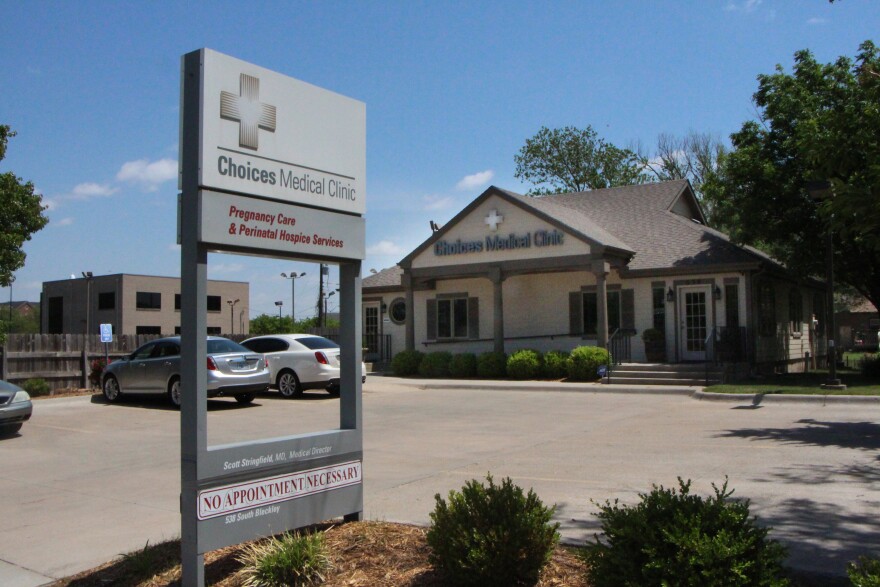Original Air date 5/27/14
Click here to go to the webpage for NPR's version of Aileen LeBlanc's story.
On May 31, 2009 a man walked into the lobby of the Reformation Lutheran Church in Wichita and shot Dr. George Tiller in the head, killing him.
Five years later, just off Kellogg Drive, South Wind Women’s Center is offering abortion services in the same building where Dr. Tiller worked. Next door is a right-to-life clinic called Choices.
The clinics are separated by a cedar fence -- and the whole world.
Until now.

KMUW presents "Crossing the Cedar Fence," a documentary that looks back at the debate over abortion, which played out in Wichita beginning with the “Summer of Mercy” protests in 1991 and again in 2001. The community was at times polarized; families, churches and friends were at odds.
The documentary aired on May 27th. It was followed by a live, civil discussion with Julie Burkhart, executive director of South Wind Women's Center, and Dr. Scott Stringfield, medical director and board chair for Choices Medical Clinic. The audio link is above.
"About one in three women are going to have abortions in their lifetimes. So we all know somebody. If it’s not ourselves, then it’s somebody else that we know who’s had an abortion.” - Julie Burkhart, executive director of South Wind Women’s Center

"No man or woman with right faculties, with a sound mind and heart, does that kind of heinous act whether it's killing George Tiller outside of his church or killing anyone. It's tragic on so many levels...pro-lifers are all lumped into one big category. We all advocate for what we think is right, but some take it to extremes." - Dr. Scott Stringfield, medical director and board chair for Choices Medical Clinic

The History
Summer Of Mercy Protests, 1991 and 2001

The Murder of Dr. George Tiller:
Early photographs of Scott Roeder:

Below, a letter from Scott Roeder, convicted of killing Dr. George Tiller, in response to KMUW News Director Aileen LeBlanc's request for an interview.

Two Clinics, One Fence.



"He kind of just kept running but he said 'I've got a gun, and I'll shoot ya.' It was like if you keep following me I'm going to shoot you. So I just froze. He'd already shot one person so I believed that he would shoot again. I didn't want to be a victim also." - Gary Hoepner, Retired Manufacturing Engineer at Boeing, eyewitness to murder of Dr. George Tiller

"They in effect took over this city and it was fairly easy for them to do that. And so that kind of treatment that they got here just enabled them to bring in hoards of people. Literally thousands of people were blockading the clinic and trying to prevent our patients from getting in." - Peggy Bowman, former spokeswoman for Dr. George Tiller

"I mean truly, isn't everybody pro-life? And does it exclude people who believe in the constitutional right of a woman to choose her medical care? Can a man choose his medical care if he chooses to do so?" - Nola Foulston, former district attorney and original prosecuting attorney in the Roeder case

"Everybody has hard things in their life. So to stand up and claim that we have all the answers and ‘I don’t know what happened to you poor thing’ is not the way we attempt to go about it.” - Marilyn Manweiler, Volunteer Director and board member at Choices Medical Clinic

"It split everything. It split churches. It split synagogues. It split tent poles. Families. And I think a lot of people took away the understanding that we don't want to go through this again."

"We have two sides shouting into the darkness, not really listening to each other and not accomplishing anything. Why? Because history seems to work that way. It takes a long time to let the conversation mature into something intelligent." - Dennis Webb, lives in the neighborhood of Reformation Lutheran Church
Music for the documentary is composed and performed by Michael and Sandy Bashaw
Additional Content, Including A Lecture By Dr. George Tiller Can Be Seen Below:







